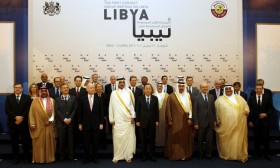Libya accused Qatar of providing rebels seeking to oust Moamer Gaddafi with anti-tank missiles, as NATO on Thursday gathered to mull calls for intensified air strikes on the strongman’s forces
 Libya accused Qatar of providing rebels seeking to oust Moamer Gaddafi with anti-tank missiles, as NATO on Thursday gathered to mull calls for intensified air strikes on the strongman's forces.
Libya accused Qatar of providing rebels seeking to oust Moamer Gaddafi with anti-tank missiles, as NATO on Thursday gathered to mull calls for intensified air strikes on the strongman's forces.
"Qatar sent French Milan missiles to the rebels in Benghazi," the eastern city that serves as their base, Libyan Deputy Foreign Minister Khaled Kaim told a press conference in Tripoli. He claimed that 20 Qatari experts were also in the city to train some 700 revolutionists and that elements of the Lebanese resistance Hezbollah were “fighting” with the revolutionists in eastern Libya.
Both Qatar and France are part of the international coalition carrying out a military intervention in Libya against Moamer Gaddafi's regime.
France and Britain agreed to step up military pressure on Gaddafi's forces after world powers meeting in Doha promised Libya's rebels cash and the means to defend themselves. French President Nicolas Sarkozy and British Prime Minister David Cameron agreed on increased military pressure at a working dinner in Paris ahead of a meeting of NATO foreign ministers in Berlin beginning Thursday, a source in the French presidency said.
The diplomatic moves came amid rising friction within the alliance over a NATO air campaign in Libya that has so far failed to change the balance of power on the ground.
US Secretary of State Hillary Clinton, who arrived in Berlin for the meetings Thursday and Friday, issued a statement denouncing what she said were continuing attacks on civilians by Gaddafi's forces.
Britain and France are pressing their partners to contribute more combat jets to protect the population from Gaddafi's forces. Only six out of NATO's 28 members are conducting air strikes while French and British warplanes are carrying out half of the flights, a French official said. The United States has moved into a back-up role in Libya, leaving nearly all the air raids in the hands of its allies.
In Doha, the international contact group on Libya decided after a daylong gathering Wednesday to set up a "temporary financial mechanism" to aid the rebels seeking to oust Gaddafi. It "affirmed that Gaddafi's regime has lost all legitimacy and he should leave and allow the Libyan people to decide their future."
to set up a "temporary financial mechanism" to aid the rebels seeking to oust Gaddafi. It "affirmed that Gaddafi's regime has lost all legitimacy and he should leave and allow the Libyan people to decide their future."
While there was a consensus that Kadhafi must go, differences emerged over arming the revolutionists. The meeting's final statement said "participants in the contact group agreed to continue to provide support to the opposition, including material support."
Qatari Prime Minister Hamad bin Jassem al-Thani told reporters this refers to "humanitarian means, and also means of defence. And that means that the Libyan people should get the means that they need to defend themselves." But he seemed to acknowledge that this view was not universally held. He said "people gathered here have different interpretations," while reiterating that "the first thing that the Libyan people need is self-defence."
Italian Foreign Minister Franco Frattini said "either we make it possible for these people to defend themselves, or we withdraw from our obligation to support defending the population of Libya."
Meanwhile, British Foreign Secretary William Hague said Britain had been providing non-lethal equipment to the rebels, and would continue to do so.
Belgium expressed opposition to arming the rebels, while Germany insisted that there could be "no military solution."
But Mahmud Shammam, a spokesman for the rebels, indicated that the arms issue does not require consensus. "If needed, we will request (arms) from countries on a bilateral basis."
